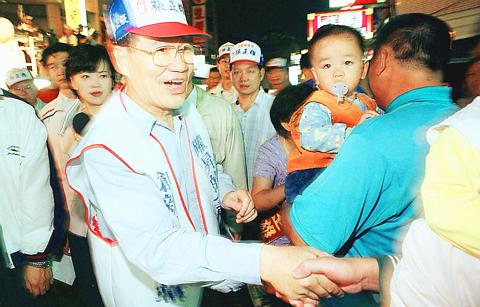The most important election in Taiwan's short democratic history -- to choose its leader for the post-Lee Teng-hui (
On the final night of campaigning, as mandated by law, all three candidates drove themselves to the brink of exhaustion with last-minute efforts to sway voters. Mostly on foot, they "swept the streets" by walking through key townships, pressing the flesh as they went, stopping only to hold a number of mass rallies.
Each camp expressed its confidence of victory, though members of some expressed concern that last-minute vote-buying by rivals could sway the outcome.

PHOTO: CHEN CHENG-CHANG
The KMT, as had been expected, brought in its heavyweights to help the party's candidate, Chang Cheng-hsiung (
The honor guard included KMT Secretary-General John Chang (
Dripping sweat from the intensity of the day, the KMT candidate passed from door to door shaking voters' hands. With supporters filling the narrow streets of his hometown amid the din of the firecrackers, officials said they were feeling ever-more optimistic.
Meanwhile, the DPP's candidate, Lin Chung-li (
Lin, escorted by DPP presidential candidate Chen Shui-bian (
At least one time during the day, the two camps came face-to-face on a street -- though no incidents of violence were reported.
While nothing is for certain in this race, all three candidates' camps had the same message -- that they will be taking home the main prize today, barring unforeseen incidents.
Liao Feng-jung (1顳p榮), a KMT official in the Yunlin county office, estimated that the party's candidate would garner around 147,000 votes. Kao Meng-ting (高孟定), Chang Jung-wei's campaign manager, predicted Chang will take away 148,000 votes. And DPP official Chou Yi-cheng (周弈|? said Lin is expected to gain 130,000 votes.
A total of 530,000 residents are eligible to vote in the by-election, and many observers expect a voter turnout of approximately 60 percent.
KMT organization department chief Johnson Chen (3紐?g) said the difference between Chang Cheng-hsiung and Chang Jung-wei will be fewer than 3,000 votes. He said the KMT had to boost its candidate's support along the county's coastal areas if it hoped to win.
From observing conditions in Yunlin County, however, it appears that the specter of vote-buying could well be the deciding factor in the race -- something both party officials and analysts have been saying from the beginning.
It is widely claimed that two of the candidates are attempting to buy votes with prices of NT$500 and NT$1,000 per vote, respectively.
In certain areas, such as an opponent's hometown, prices are said to be as high as NT$3,000.
DPP secretary-general Yu Shyi-kun said he worried about last-minute vote-buying today, just before voters begin filing into polling stations around the county.
Another official at Chang Jung-wei's headquarters said if no more money is injected into the "market," the independent candidate is definitely going to win.

A magnitude 7.0 earthquake struck off Yilan at 11:05pm yesterday, the Central Weather Administration (CWA) said. The epicenter was located at sea, about 32.3km east of Yilan County Hall, at a depth of 72.8km, CWA data showed There were no immediate reports of damage. The intensity of the quake, which gauges the actual effect of a seismic event, measured 4 in Yilan County area on Taiwan’s seven-tier intensity scale, the data showed. It measured 4 in other parts of eastern, northern and central Taiwan as well as Tainan, and 3 in Kaohsiung and Pingtung County, and 2 in Lienchiang and Penghu counties and 1

FOREIGN INTERFERENCE: Beijing would likely intensify public opinion warfare in next year’s local elections to prevent Lai from getting re-elected, the ‘Yomiuri Shimbun’ said Internal documents from a Chinese artificial intelligence (AI) company indicated that China has been using the technology to intervene in foreign elections, including propaganda targeting Taiwan’s local elections next year and presidential elections in 2028, a Japanese newspaper reported yesterday. The Institute of National Security of Vanderbilt University obtained nearly 400 pages of documents from GoLaxy, a company with ties to the Chinese government, and found evidence that it had apparently deployed sophisticated, AI-driven propaganda campaigns in Hong Kong and Taiwan to shape public opinion, the Yomiuri Shimbun reported. GoLaxy provides insights, situation analysis and public opinion-shaping technology by conducting network surveillance

‘POLITICAL GAME’: DPP lawmakers said the motion would not meet the legislative threshold needed, and accused the KMT and the TPP of trivializing the Constitution The Legislative Yuan yesterday approved a motion to initiate impeachment proceedings against President William Lai (賴清德), saying he had undermined Taiwan’s constitutional order and democracy. The motion was approved 61-50 by lawmakers from the main opposition Chinese Nationalist Party (KMT) and the smaller Taiwan People’s Party (TPP), who together hold a legislative majority. Under the motion, a roll call vote for impeachment would be held on May 19 next year, after various hearings are held and Lai is given the chance to defend himself. The move came after Lai on Monday last week did not promulgate an amendment passed by the legislature that

AFTERMATH: The Taipei City Government said it received 39 minor incident reports including gas leaks, water leaks and outages, and a damaged traffic signal A magnitude 7.0 earthquake struck off Taiwan’s northeastern coast late on Saturday, producing only two major aftershocks as of yesterday noon, the Central Weather Administration (CWA) said. The limited aftershocks contrast with last year’s major earthquake in Hualien County, as Saturday’s earthquake occurred at a greater depth in a subduction zone. Saturday’s earthquake struck at 11:05pm, with its hypocenter about 32.3km east of Yilan County Hall, at a depth of 72.8km. Shaking was felt in 17 administrative regions north of Tainan and in eastern Taiwan, reaching intensity level 4 on Taiwan’s seven-tier seismic scale, the CWA said. In Hualien, the